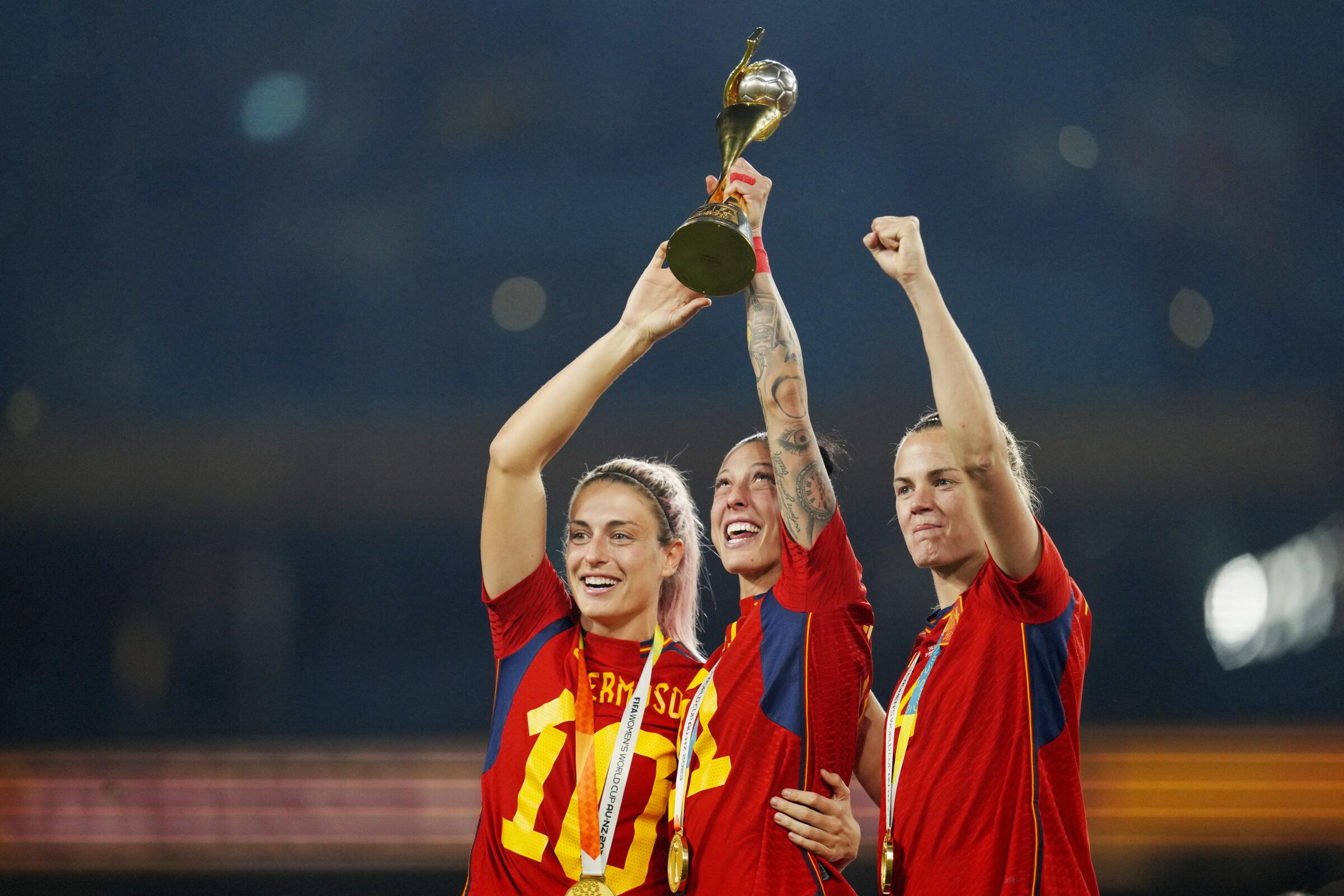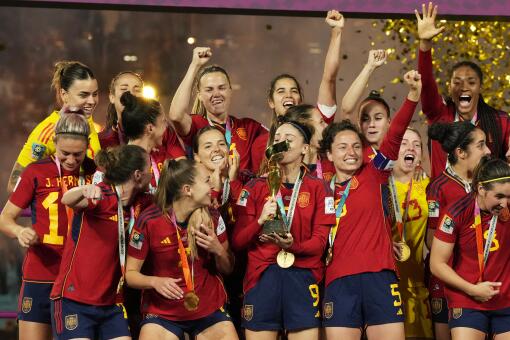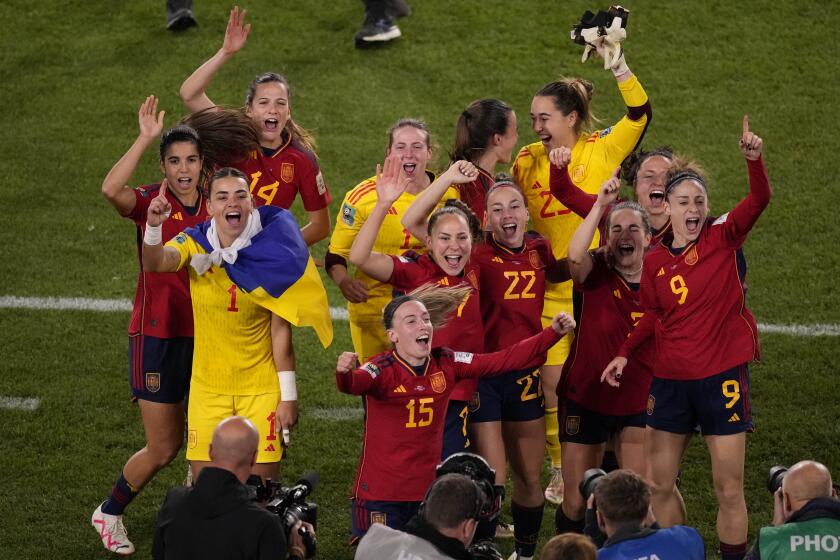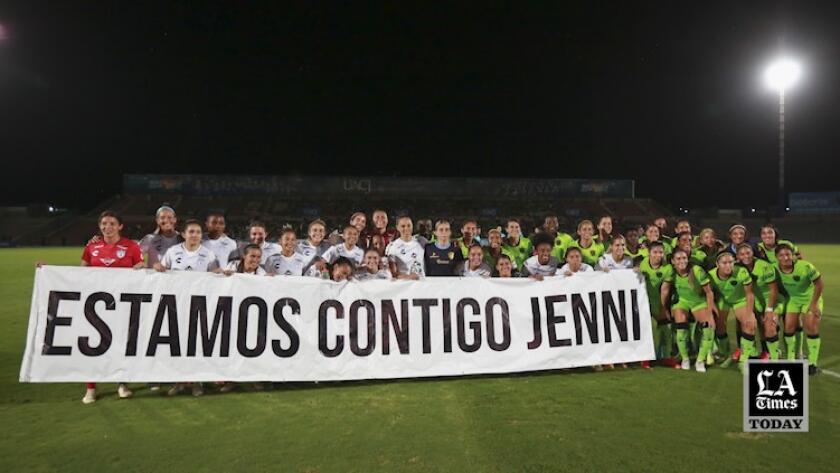Kevin Baxter writes about soccer and hockey for the Los Angeles Times. He has covered seven World Cups, five Olympic Games, six World Series and a Super Bowl and has contributed to three Pulitzer Prize-winning series at The Times and Miami Herald. An essay he wrote in fifth grade was voted best in the class. He has a cool dog.
- Share via
1
The just-concluded World Cup was the best played, most exciting and most competitive women’s soccer tournament in history.
That’s not hyperbole, it’s fact. We know that because … well, it was obvious to anyone who watched even a fraction of the games. But we also know that because FIFA president Gianni Infantino told us so.
“Fantastic, fantastic World Cup. I have to say the best, the greatest, the most magic FIFA Women’s World Cup ever,” Infantino said.
Unfortunately, that wasn’t all he said. Infantino is a bumbling orator and some of the things he went on to say would have been better left unsaid.
We’ll get to that in a minute. First, the soccer.
This summer’s tournament made history as soon as the first ball was kicked. With 32 teams and 64 games, it was the largest women’s World Cup, the first to be played in the Southern hemisphere and the first to be played in two countries. And the setting was spectacular, with Australia and New Zealand proving to be splendid hosts — the venues were top-notch, the people friendly and everyone pitched in. When an overly competitive and unpredictable group stage scrambled fans’ travel plans for the knockout rounds, for example, Air New Zealand waived all change fees and booked passengers on to the correct destination.
And there were a lot of tickets to change since the tournament’s total attendance of 1.98 million was the largest for a women’s sporting event. FIFA predicts the global TV audience will be about 2 billion when all the math is done; in China nearly 54 million turned in for one group-play match alone. The tournament also earned a record $570 million in revenue.
On the field Spain, which beat England 1-0 in the final, became the first champion ranked outside the world’s top five. But that only hints at how competitive the World Cup, once nearly as lopsided and predictable as a Harlem Globetrotters’ road trip, has become.
With second-ranked Germany going out in the group stage for the first time and the No. 1 U.S. leaving in the round of 16, this was the first World Cup in which neither of the world’s top two teams made the quarterfinals, much less the final.
New Zealand, meanwhile, won a game for the first time in six World Cups, then promptly lost to the Philippines, a tournament debutante. Canada became the first reigning Olympic champion to be eliminated in the group stage, while Jamaica, ranked No. 43 in the world, held No. 5 France and No. 7 Brazil scoreless to reach the round of 16.
In fact, at least one team was shut out in 45 of the tournament’s 64 games; in 10 of them, neither team scored. That wasn’t a result of poor offense as much as it was stellar defense and goalkeeping. Consider the U.S., which scored 18 times in the group stage in 2019. This summer it scored just four goals, none in its final 238 minutes.

So where did the sudden parity in women’s soccer come from? Investment.
Since the last World Cup in 2019, Barclay’s bank, Sky Sports and the BBC have spent a reported $60 million on England’s Women’s Super League, support the national team rewarded by winning a European Championship in 2022 and reaching the World Cup final this year. Japan launched the 12-team domestic WE League — the initials stand for Women’s Empowerment — in 2020 and three years later, with 14 of the 23 players on its national team coming off WE rosters, the Nadeshiko reached the World Cup quarterfinals. WE players Hinata Miyazawa and Mina Tanaka led the tournament in scoring and tied for the lead in assists, respectively.
Then there’s Spain, which failed to win a game during its World Cup debut eight years ago. Spanish players publicly protested the lack of backing for the team at that tournament and during the next five years. Iberdrola, an electric utility giant, and others stepped up with generous corporate support, a $10-million media-rights package was signed and the country’s women’s league was professionalized.
On Sunday, Spain won the senior World Cup a year after capturing the U-17 and U-20 championships.
The Spanish soccer federation’s president says he ‘made a mistake’ in kissing player Jenni Hermoso on the lips after Spain’s World Cup-clinching win.
Which brings up back to Infantino, who oversaw a 500% increase in the prize-money purse, to $150 million, for this World Cup. And while that remains just about a third of the $440 million FIFA paid out in last year’s men’s tournament, Infantino has pledged the organization will offer equal prize money in the next men’s and women’s tournaments, in 2026 and 2027.
Infantino also pushed to increase the tournament field from 24 to 32 teams this summer, arguing that the carrot of World Cup earnings would push smaller federations to invest in their programs. Critics pushed back, saying more teams would dilute the competition, but Infantino was right: of the eight teams making their World Cup debuts four — Morocco, Zambia, the Philippines and Portugal — all won games, with Morocco advancing to the round of 16.
That also proved a much sounder strategy for increasing the appeal of the women’s game than the one Infantino’s predecessor, Sepp Blatter, once promoted. “They could, for example, have tighter shorts,” said Blatter, who proposed kits featuring hot pants. “Female players are pretty, if you excuse me for saying so.”
Complete coverage of the 2023 FIFA Women’s World Cup in Australia and New Zealand from the Los Angeles Times.
But if Infantino’s heart is in the right place, his mouth has yet to follow. At a conference in Sydney days before the World Cup final, the FIFA boss made an offensive, condescending speech in which he put the onus for change on the women, not on the power brokers at the top of the sport who control the purse strings — and most everything else.
“Pick the right battles. Pick the right fights,” he urged. “You have the power to convince us men what we have to do and what we don’t have to do. You do it. Just do it.”
It makes you wonder if Infantino has any strong women in his life. The motto for this World Cup, after all, was “Beyond Greatness.” Four years ago in France it was “Le Moment de Briller,” (The Moment to Shine), which was rendered in English as the subversive-sounding and patronizing “Dare to Shine.” Imagine FIFA urging Lionel Messi or Cristiano Ronaldo to go “beyond greatness” and “dare to shine.”
Nevertheless two days after the FIFA president’s talk, Spain shone brightly, daring to be great in a convincing performance to close out a World Cup in which, thankfully, the players’ actions spoke louder than Infantino’s words.
⚽ You have read the latest installment of On Soccer with Kevin Baxter. The weekly column takes you behind the scenes and shines a spotlight on unique stories. Listen to Baxter on this week’s episode of the Corner of the Galaxy podcast.
- Share via
Watch L.A. Times Today at 7 p.m. on Spectrum News 1 on Channel 1 or live stream on the Spectrum News App. Palos Verdes Peninsula and Orange County viewers can watch on Cox Systems on channel 99.









